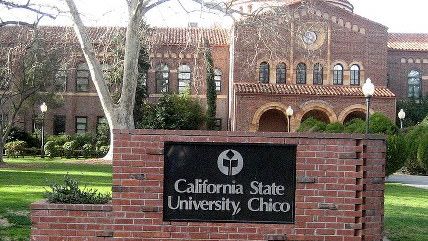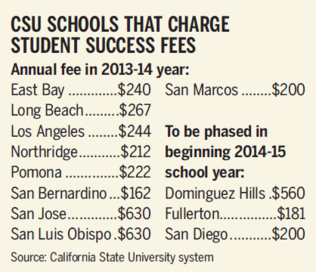What the Hell Are 'Student Success Fees'? (Or: How to Raise Tuition Without Raising Tuition)


California instituted a tuition freeze in 2012 for its state university system. Instead the University of California and the California State University systems each got millions in additional funding from the state. But if there's anything that can be learned about the intricacies of public funding methods in California it is that there are these magical creatures called "fees" that will let government agencies or publicly funded institutions work around any restrictions on raising things like taxes and tuitions. Just call something a "fee" and you can apply it to anything. It's like duct tape for budgets.
So many California colleges instituted something called "Student Success Fees." What are these for? As the Sacramento Bee explains, "The millions in additional funds have paid for hiring faculty, adding course sections and technology upgrades." That's what tuition is for, isn't it? So the colleges got additional funding increases from the state and increased tuition anyway, despite the freeze. They just called it a "fee." Now that's an education for California college students they can use.
The "fees" have started causing problems, because of course, it turns out they often have little to do with "student success," (whatever that even means):
Sonoma State tabled plans for a new success fee in February after students circulated petitions threatening to withhold future donations to the school. San Jose State students staged a walkout in April when a budget review revealed that nearly 40 percent of success fee revenue went to athletics, leading the university to lower its fee by $40 for next year, rather than hiking it by $160 as originally planned.
The legislature is considering forcing a one-year moratorium on raising or implementing new fees of this kind, in exchange for giving the college system even more money. As is typical in college budget reporting, there is no discussion of the massive administrative bloat that is causing college prices to skyrocket and to institute "fees" for the things tuition is supposed to be covering in the first place.
The California Faculty Association, which represents CSU professors, also wants the moratorium, but not for reasons that we might hope:
Lillian Taiz, a professor of history at CSU Los Angeles and president of the California Faculty Association, which represents CSU professors, said the faculty is strongly opposed to student success fees.
"This is transferring the responsibility of funding higher ed from all of us together to individuals," she said. It's the "very worst thing you can possibly do."
Declaring that the individuals going to college being responsible to pay for going to college is the "worst thing you can possibly do"? Suddenly I feel an urge to support the fees after all. If the costs were more adequately borne by the consumers directly and not subsidized by hundreds of millions from the state, colleges probably wouldn't be able to charge so much and would have to maybe scale back on that administrative bloat in order to keep their students. Student debt is already well out of hand. As it is, students are more and more considering the costs when deciding which college to attend.


Show Comments (19)